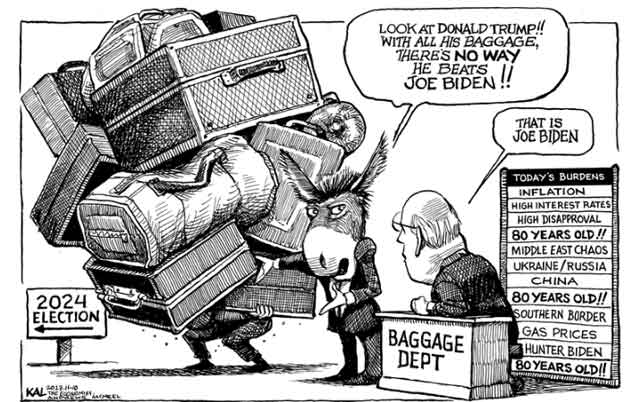
In the music industry, nostalgia acts are valuable properties, regularly turning up in top spots on lists of the most lucrative concert tours. It's the same in our national politics.
Now Democrats are facing a choice: Should they turn to a kinder, gentler version of nostalgia to defeat Trump?
Former vice president Joe Biden's speech at his Saturday campaign rally was in many ways a paean to days gone by. Biden no longer wants us to be angry. "Our politics has become so mean, so petty, so personal, so negative, so partisan, so angry and so unproductive," he said early in the speech. His solution? Bipartisanship - as he practiced.
"I know how to make government work," Biden said. "I've worked across the aisle. I've worked to reach consensus." It wasn't just a call back to his time as Barack Obama's wingman vice president but also to his days in the Senate when, to hear him tell the tale, politicians ruled in the best interests of everyone, regularly struck bipartisan deals, and didn't shout at or demonize their opponents in the pursuit of scoring political points.
Oh, really?
Let's take a trip down memory lane. As it turns out, like many people waxing nostalgic for the past, Biden - and by extension, the rest of us - is engaging in selective remembrances.
After Obama's win in 2008, Republicans didn't work with the new president to make things better. Instead, they stymied almost anything they could. The Affordable Care Act didn't get a single vote from the party's pols, despite the fact that it was based on a Republican design.
Yes, Biden pointed to the American Recovery and Reinvestment Act, the economic stimulus package passed in 2009, which "helped save this nation from economic ruin." But in fact, not a single Republican in the House supported it. In the Senate, it garnered support from just three Republican senators. One of them was Susan Collins (R-Maine), who is now most famous for hand-wringing about her party's more extreme measures before voting for them anyway.
But as Reed Hundt, a member of the Obama transition team, wrote in his recent book, the recovery act stimulus was too small and inadequate to the task at hand. It's in part why the recovery in the wake of the Great Recession was so anemic - and partly why Republicans took the House in 2010 and partly why Trump triumphed over Hillary Clinton in 2016.
"If you had asked me just a few years ago if American democracy was at risk," said Biden on Saturday, "I would have laughed. No more."
But let's be clear: American democracy has been at risk for decades. It was President Dwight D. Eisenhower who warned about the dangers of the "military-industrial complex." More recently, it was the Supreme Court's 2010 Citizens United decision that set off a tsunami of corporate spending on political campaigns. Academic work - published during the Obama years - shows that government routinely favors the interests of top earners over the mass population. It's also a function of the imperial presidency itself. The Obama administration went after record-breaking number of government whistleblowers by charging them with violations of the Espionage Act.
And Biden was there for much of it. In fact, more than a small amount of Biden's "consensus" consisted of repeatedly moving right and carrying water for corporate interests. Biden voted for tough-on-crime bills that led to mass incarceration - especially of African Americans. He presided over Anita Hill's testimony to Congress about her alleged sexual harassment by now-Supreme Court Justice Clarence Thomas, allowing Republicans on the Senate Judiciary Committee to treat her with such derision and contempt that he's still apologizing for it in 2019.
His fealty to the financial services industry was so over the top, he acquired the nickname "the senator from MBNA," a credit card company subsequently acquired by Bank of America. Biden repeatedly pushed legislation that made it harder for cash-strapped and overwhelmed Americans to declare bankruptcy. As a result, he bears partial responsibility for explosion in student debt that's all but financially crippling a generation.
Biden will, over the next several months, need to do more than make grand statements that hark back to the past. He'll need to let us know what he's actually proposing to bring us all together once more.
It's likely that only then we will be able to determine if he's got the answer that's eluded everyone else, or if he's simply a golden oldies act, singing tunes that many love but that are no longer in step with the times.
If that's the case, it's possible voters will begin to turn to candidates singing a different song. Or, even worse, they'll decide to give the nostalgia act currently residing in the White House another four years on the top of the charts.
Sign up for the daily JWR update. It's free. Just click here.
(COMMENT, BELOW)
Previously:
• 04/30/19: Why Warren is calling Biden out
• 04/04/19: Enough with the excuses. It's time for Sanders to release his tax returns
• 04/01/19: Why are we getting so many robocalls!?
• 06/06/18: Bill Clinton's #MeToo reckoning
Helaine Olen is the author of "Pound Foolish: Exposing the Dark Side of the Personal Finance Industry." Her work has appeared in Slate, the Nation, the New York Times, the Atlantic and many other publications. She serves on the advisory board of the Economic Hardship Reporting Project.

 Contact The Editor
Contact The Editor
 Articles By This Author
Articles By This Author